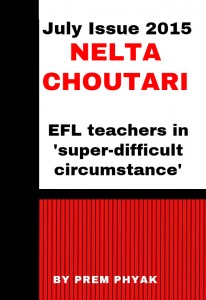Namaste and welcome to the July 2015 issue of Choutari!
We hope you enjoyed our June issue which also focuses on education and EFL teaching in Nepal’s post-disaster situation. You can read the issue here.
In this issue, we have three blog posts and a photography project. In my own article, I have discussed the preliminary findings of the survey on the role of EFL teachers in Nepal’s post-disaster situation, which I call “super-difficult circumstance.” The teachers’ responses reveal a multitude of difficulties (e.g., psycho-social, educational and economic challenges) caused by the recent earthquake. Most importantly, the findings of the survey reveal the “transformative agency” of EFL teachers who transgress the “schooled pedagogy” and can create their own “pedagogy of disaster” to help their students recover from the traumatic experience.
In the second post, Nirjana Sharma, an education journalist based in Kathmandu, shares a featured news story based on her observation of the schools on the resumption after a month-plus unscheduled holidays following the earthquake.
 In another article, Dinesh Thapa shares with us his own involvement in the relief and recovery operations in the earthquake-affected areas. He begins with telling his own story and discusses empirical findings about how people are affected by the earthquake. His article is a testimony to redefining the role of “teacher-as-researcher” and an important material for EFL teaching.
In another article, Dinesh Thapa shares with us his own involvement in the relief and recovery operations in the earthquake-affected areas. He begins with telling his own story and discusses empirical findings about how people are affected by the earthquake. His article is a testimony to redefining the role of “teacher-as-researcher” and an important material for EFL teaching.
Praveen Kumar Yadav’s post focuses on his own classroom experience teaching his students after the earthquake. His story documents the importance of teachers’ role in facilitating the earthquake-related discussions in EFL lessons. More strikingly, the way in which he has framed the devastating stories in his “world literature” course resonates what I call the “pedagogy of disaster.”
The Choutari team always explores new ways to promote pedagogical discussions among EFL teachers. We have initiated a “photography project” for EFL teaching. Influenced by the Critical Photography Theory” (Wells, 2015) and the “Critical Art Pedagogy” (Cary, 2011), the goal of this project is to promote the use of photos/pictures in EFL teaching.
Table of contents
- From ‘schooled pedagogy’ to ‘pedagogy of disaster’: The role of EFL teachers in the super-difficult circumstance of post-disaster Nepal, by Prem Phyak
- School resumption brings smiles to children, by Nirjana Sharma
- The impacts of the earthquake on education: Contemplation of an EFL teacher, by Dinesh Thapa
- I survived and have a story to tell, by Praveen Kumar Yadav
- The photography project’: Pictures in EFL teaching, by Choutari Team
I hope you enjoy reading this issue.
Happy readings!
Prem Phyak (Guest editor)
(With Praveen Kumar Yadav)